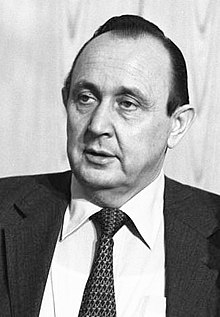
Back Hans-Dietrich Genscher Afrikaans Hans-Dietrich Genscher ALS هانز ديتريش غينشر Arabic هانز ديتريش جينشر ARZ Ганс-Дзітрых Геншэр Byelorussian Ханс-Дитрих Геншер Bulgarian Hans-Dietrich Genscher Catalan Hans-Dietrich Genscher Czech Hans-Dietrich Genscher Danish Hans-Dietrich Genscher German
Hans-Dietrich Genscher | |
|---|---|
 Genscher in 1978 | |
| Vice Chancellor of Germany West Germany until 1990 | |
| In office 1 October 1982 – 17 May 1992 | |
| President | Karl Carstens Richard von Weizsäcker |
| Chancellor | Helmut Kohl |
| Preceded by | Egon Franke |
| Succeeded by | Jürgen Möllemann |
| In office 17 May 1974 – 17 September 1982 | |
| President | Gustav Heinemann Walter Scheel Karl Carstens |
| Chancellor | Helmut Schmidt |
| Preceded by | Walter Scheel |
| Succeeded by | Egon Franke |
| Federal Minister for Foreign Affairs | |
| In office 1 October 1982 – 17 May 1992 | |
| Chancellor | Helmut Kohl |
| Preceded by | Helmut Schmidt |
| Succeeded by | Klaus Kinkel |
| In office 17 May 1974 – 17 September 1982 | |
| Chancellor | Helmut Schmidt |
| Preceded by | Walter Scheel |
| Succeeded by | Helmut Schmidt |
| Leader of the Free Democratic Party | |
| In office 1 October 1974 – 23 February 1985 | |
| Preceded by | Walter Scheel |
| Succeeded by | Martin Bangemann |
| Federal Minister of the Interior | |
| In office 22 October 1969 – 16 May 1974 | |
| Chancellor | Willy Brandt |
| Preceded by | Ernst Benda |
| Succeeded by | Werner Maihofer |
| Member of the Bundestag for North Rhine-Westphalia | |
| In office 19 September 1965 – 26 October 1998 | |
| Constituency | FDP List |
| Personal details | |
| Born | 21 March 1927 Reideburg, Prussia, Germany |
| Died | 31 March 2016 (aged 89) Wachtberg, Germany |
| Political party | Free Democratic Party of Germany (1952–2016) |
| Other political affiliations | Nazi Party (until 1945) Liberal Democratic Party of Germany (GDR) (1946–1952) |
| Spouses | Luise Schweitzer
(m. 1958; div. 1966)Barbara Genscher (m. 1969) |
| Alma mater | |
| Occupation | Politician |
| Signature | |
| Website | genscher |
Hans-Dietrich Genscher (21 March 1927 – 31 March 2016) was a German statesman and a member of the liberal Free Democratic Party (FDP), who served as Federal Minister of the Interior from 1969 to 1974, and as Federal Minister for Foreign Affairs and Vice Chancellor of Germany from 1974 to 1992 (except for a two-week break in 1982, after the FDP had left the Third Schmidt cabinet), making him the longest-serving occupant of either post and the only person to have held one of these positions under two different Chancellors of the Federal Republic of Germany. In 1991 he was chairman of the Organization for Security and Co-operation in Europe (OSCE).
A proponent of Realpolitik, Genscher has been called "a master of diplomacy".[1] He is widely regarded as having been a principal "architect of German reunification".[2] In 1991, he played a pivotal role in international diplomacy surrounding the breakup of Yugoslavia by successfully pushing for international recognition of Croatia, Slovenia and other republics declaring independence, in an effort to halt "a trend towards a Greater Serbia".[3] After leaving office, he worked as a lawyer and international consultant. He was President of the German Council on Foreign Relations and was involved with several international organisations, and with former Czech President Václav Havel, he called for a Cold War museum to be built in Berlin.
- ^ A master of diplomacy, Deutsche Welle.
- ^ Whitney, Craig R.; Eddy, Melissa (1 April 2016). "Hans-Dietrich Genscher, an Architect of German Reunification, Dies at 89". The New York Times. Retrieved 1 April 2016.
- ^ Recognizing Slovenia, Croatia brought peace, Genscher says, Deutsche Welle.
© MMXXIII Rich X Search. We shall prevail. All rights reserved. Rich X Search